As the MMC's Best of 2017 week continues, we move onto the year's best scenes. Some of these weren't in the best films, but the spark of genius can show up in a movie made by my favorite director or in a film that gave me a rage headache. The more spoiler-y these get, the further down the list they are.
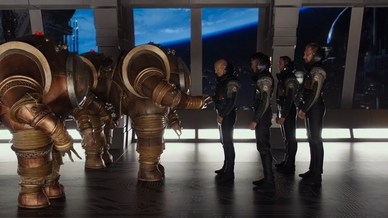
Luc Besson's space opera took a tremendous nosedive the second the lead characters, played by Dane Dehaan and Cara Delevigne, stepped onscreen, but Valerian et cetera begins with a stirring sequence that hints at what could have been. In the international space station that will eventually become the eponymous, new nations are greeted to the brotherhood of space-farers, until finally, aliens are going through the same motions. Each scene in the montage is simply one group of emissaries greeting the commanders of the station, but the combination of the Sagan-esque optimism and Bowie's Space Oddity playing out in full makes the viewer wonder where this level of inspiration was in the rest of Valerian.
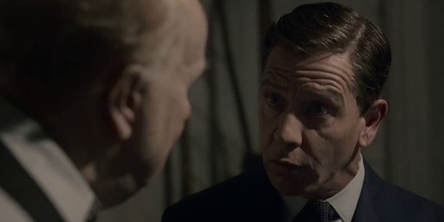
Joe Wright's attempt to dramatize the events surrounding the Allied evacuation of troops at Dunkirk goes to the highest levels of English power, as Churchill, newly installed as prime minister, weighs his rapidly declining options. At a moment of despair, after Wright has spent much of the preceding film visually depicting the solitary burden of leadership, Churchill, played by Gary Oldman, is left at the end of his rope in a windowless storage room at his house. The light is rough and he looks like a man at death's door. Sensing how tenuous things are becoming, King George (Ben Mendelsohn) pays Churchill a visit, and these two great men of history speak to each other as average men, scared for the future and unsure if they can shoulder the burden that they know find themselves under. These kinds of humanizing moments are the best of the biopic genre, emphasizing that great achievements are rarely a sure thing and that heroes face doubt just like everyone else.
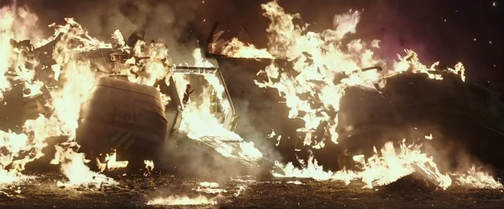
Another sci-fi film that can't live up to its greatest moments, Ridley Scott's full-fledged return to the Alien franchise after the half-measure of Prometheus demonstrates that his talent for tension is still in peak form. The first contact sequence in Alien: Covenant, in which two groups of explorers are having run-ins with proto-xenomorphs at the same time, is a terrifying you-are-there series of escalations and unlucky turns. Amy Seimetz plays the character closest to the action, and the palpable sense of desperation that she's playing is enough on its own to raise heartrates. As the two groups get closer together, Scott's editing and cinematography get more frenetic until a final explosion that is immaculately framed against the horizon. Scott needs to work with better writers for these films, but when he's unshackled from portentous talk of origins and creators, he crafts scenes just as viscerally as he has at the highpoints of his career.
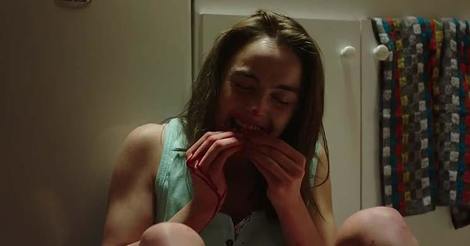
The best scene in Julia Ducornau's impossibly assured debut about personal collegiate awakenings, sexual and otherwise, is another series of escalations, though Raw is operating at a high level from its opening frames. What starts as a bikini wax between two sisters, one of them experienced and the other virginal, devolves into a serious injury. In a film about surrendering to primal and taboo impulses, an already squirm-inducing scene becomes ecstatic as the viewer watches either gaping or through closed fingers. Unsatisfied with resting on her gross laurels, Ducornau again ratchets the insanity up on the scene with a final confession of sisterly similarities. Raw is full of gasps and surprises, and the film rests on the fulcrum of this scene. Durcornau gets this turning point exactly right.

Steven Soderbergh has a reputation as a stylist and one who, while great at what he does, isn't the most in tune with things like raw emotion. No one's tearing up at Ocean's Eleven. Imagine my surprise, then, that the most affecting scene from 2017 comes from Soderbergh's blue-collar heist film Logan Lucky. Ringleader Jimmy Logan (Channing Tatum) has had to move up his heist to the same day as his daughter's beauty pageant, and despite his law-breaking morning, still needs to make it to the pageant in the evening. He arrives just in time to hear his little girl abruptly change her talent portion to John Denver's Take Me Home Country Roads, her daddy's favorite song. She's not the best singer, and there's no routine to go with her performance, but it's so earnest that it easily wins over both the crowd at the pageant, and the crowd in my theater too, who engaged in a sing-along. That kind of community is the point of the theater-going experience, and Soderbergh most powerfully expressed it in the previous year.
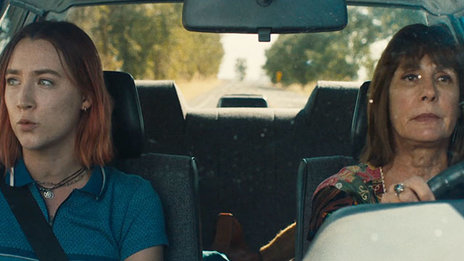
Greta Gerwig's stellar autobiographical directorial debut is packed with memorable scenes, and its best is its simplest. In the relationship between Lady Bird (Saorsie Ronan) and her mother Marion (Laurie Metcalf), the film has diligently avoided full rapprochement between them. Instead, Marion throws cold water on Lady Bird's dreams and Lady Bird is casually cruel towards her parents' economic status. As Lady Bird is about to leave for college, Marion drops her daughter off with her father at the terminal while she circles the airport instead of parking. Gerwig's camera stays with Marion as she drives away, and Metcalf tears the viewer's heart out with all the waves of emotion on her face. Regretful of her pride, she races back to the airport but it's too late. So much of Lady Bird is about how hard it can be to be vulnerable and genuine, and Metcalf's brilliant performance at the airport demonstrates the price of holding back, even as she holds back nothing.

Paul Thomas Anderson's restrained latest and Daniel Day Lewis' presumptive last ever gives cinema another prickly anti-hero, though this one's not as overt in his monomania as their last collaboration, Daniel Plainview. Plainview was economic dominance personified, while Phantom Thread's Reynolds Woodcock is personal dominance, a man who needs everything to be just so. This particular form of childishness is reinforced by his mommy issues, something his lover Alma (Vicky Krieps) is well keyed into in a climactic scene. When Reynolds is incapacitated, he's at his most pliable and most able to receive love and affection. Having already poisoned him once, she endeavors to do so again by preparing him an omelet with toxic mushrooms. She does this in his suspicious presence, meticulously chopping the ingredients and setting the table for him. It's reminiscent of the final scene of Big Night, replacing that film's use of cooking as a form of humility with cooking as a form of domination. As Alma puts the meal in front of Reynolds and he takes a knowing bite, it's obvious who's in control.
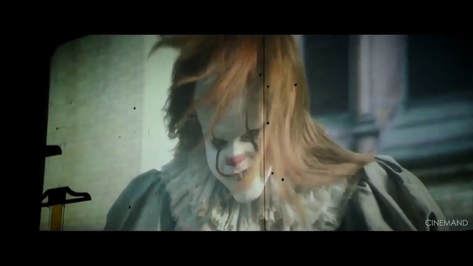
Andy Muschietti's horror hit It is one of the year's most fun films, both for its humor and for the scares Muschietti earns over and over. The height of this combined achievement occurs in a garage, as the kids of the Losers Club hook up a projector to look at a map of their haunted town's sewers. Their amusingly vulgar back-and-forth takes over and makes ringleader Bill (Jaeden Lieberher) work to get the necessary exposition out, but before long, It has taken over the projector, flashing unnerving photos onto the wall where he's morphing into Bill's mother. The panicking group gets the slides to stop their possessed flicking, but just when the scene seems to be over, it very much is not. What follows made me exclaim and pushed me back into my seat, the kind of scare someone like John Carpenter would be proud of.
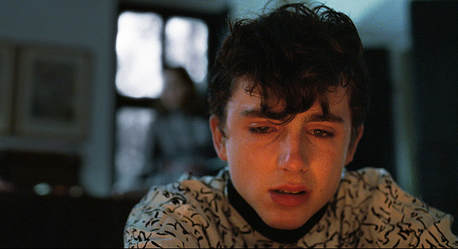
Another scene of a static camera on a superb actor's face, the end credits of Luca Guadagnino's coming-of-age story leave the viewer with a deep melancholy to match the protagonist's. Timothee Chalamet's Elio has been separated from his summer romantic partner Oliver (Armie Hammer) for months, but a Hannaukah call from Oliver leaves Elio just as wounded as he was when Oliver left. The older man is engaged, cementing the fleeting nature of their relationship even as Elio thought it might one day turn into something more permanent. As Elio sits in front of a crackling fire and tearfully and wistfully thinks back on the year he's had, Sufjan Stevens' Visions of Gideon plays and the title card comes up. Call Me By Your Name works best when Elio as a young man is at the forefront, and this final scene is exactly that, a person in a transitional stage digesting his experience and feeling his complex feelings.
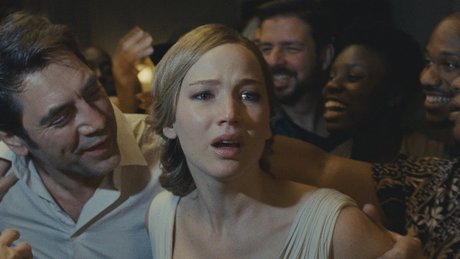
Darren Aronofsky's allegorical horror film can be viewed as a comedy of manners for its first hour. Guests steadfastly ignore Jennifer Lawrence's nameless character's admonitions to not destroy her home, giving shrugs of apology before going right back to the same behavior. Eventually, rejected social niceties give way to full on bacchanalia and apocalypse, and the biblical references get to their most overt place. Lawrence's vain husband cannot help but present their infant son to the awed assemblage, again over her objections. They crowd-surf the baby until things go very wrong, and as Lawrence fights her way through them to her son, things go more wrong as the film crescendoes in a burst of sheer insanity. The big reveal provoked a gleeful cackle, brought on by disbelief that a director known for putting extreme imagery on film might have topped himself.
 RSS Feed
RSS Feed